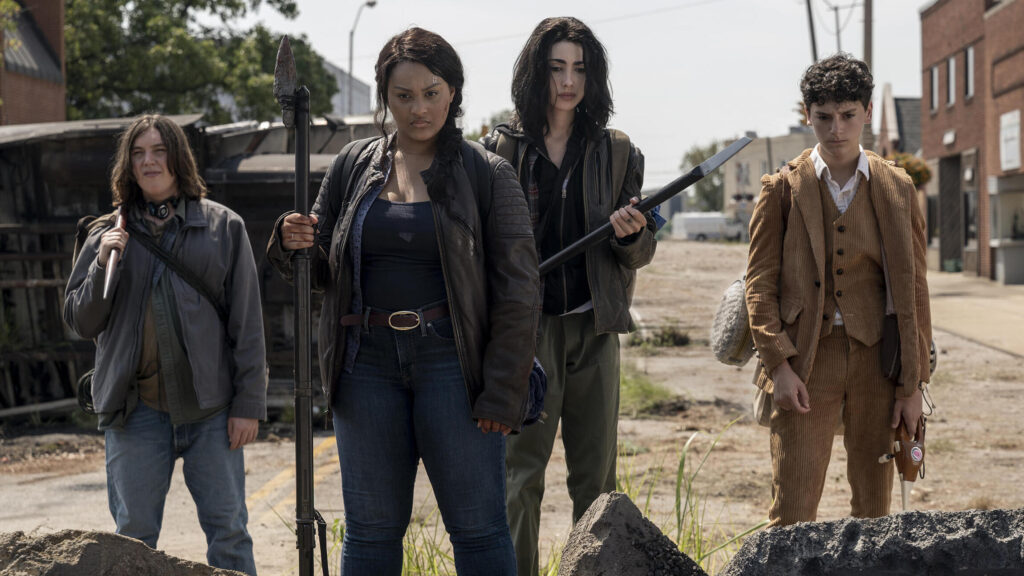In the first episode of “The Walking Dead: World Beyond,” AMC’s latest push to expand the Walking Deadiverse and its first to center on teenagers, there’s one fascinating, genre-bending moment. Iris (Aliyah Royale) has rushed, bright-eyed, to the home of someone she cares for. But as so often happens when you’re young and the hero of a story, she’s missed her window. So Iris, heartbroken but far from shocked, slumps down to the carpet. She stares up, mournfully, at a snarling zombie. This is her so-called life. It’s a brief but undeniably arresting scene, and I regret to inform you that it is an outlier.
“The Walking Dead: World Beyond” does not live up to its potential. It simply will not apply itself. Set a decade after the whole zombie apocalypse thing (the event which spurred both “The Walking Dead” and “Fear the Walking Dead,” the first TWD spinoff), “World Beyond” aims to capture just a little of that “Stranger Things” magic by centering its story on four youths who are coming of age in a world of the dead. There’s the aforementioned Iris, a high school class President whose Paris Gellar-esque drive stems not from the desire to go to Harvard but the desire to help prevent the extinction of humanity. There’s Hope (Alexa Mansour), her shit-stirring, illegal-wine-making sister; both girls are struggling with a whole lot of guilt and trauma, not to mention the absence of their father, a brilliant scientist who’s traveled elsewhere as part of a shadowy alliance with the highly secretive and well-supplied Civic Republic. (Julia Ormond is among their number; one assumes they all look that chic in their imposing black uniforms.)
We won’t reveal what ultimately sets them on their path, though Iris’ untimely encounter with the undead (here called “empties,” rather than the “walkers” of old) plays a part. We will say that the path leads them away from the relatively safe and secure college campus where they and others have sheltered for the last decade. As they venture out for a long, long walk through a dangerous world, they’re joined by two other teens: the reserved and ostracized Silas (Hal Cumpston), a big guy with an unknown but palpable tragic past, and the younger Elton (Nicolas Cantu), a studious eccentric haunted by his own losses and convinced, as one might be, that the end for all of them is pretty damn near. Nor are they without probable reinforcements: hot on their trail are Felix (Nico Tortorella), their self-defense teacher and the sisters’ appointed guardian, and Huck (Annet Mahendru of “The Americans”), a bad-ass who steadfastly refuses to talk about her past. They journey through decrepit parks and around enormous tires fires in pursuit of things like truth, family, hope, science, escape, and absolution.

Writing it out, it sure looks like a lot. And yet in the curiously flat two episodes provided for review, “World Beyond” never quite finds a way into its own story. It’s as though someone said “Let’s make it kind of like ‘Stand By Me’” and called it a day without stopping to ask what made “Stand By Me” good in the first place. There are moments, though fleeting, in which co-creators Matthew Negrete and Scott M. Gimple and the rest of the show’s writers begin to wrestle with what growing up in this world must have been like. What has it cost Iris to maintain even the appearance of positivity and outward calm? What does the fatalistic Hope (it’s not subtle, this show) do to vent some of the fury she feels about her own helplessness? How do grief, fear, and remorse power them? Why do they think theirs is a good or sound or even remotely sane idea—and what if, in fact, they know it to be otherwise? Yet every time “World Beyond” dances up to one of these questions, it dances away just as quickly, like a hand darting back from a too-hot stove. The sisters don’t often feel like sisters, the connections between the four rarely crystallize into anything interesting, and most damning, there’s precious little in the way of a sense of danger. You set kids loose on a zombie-filled world and then they just … camp? In this economy?
It would be going too far (and would be too cute by half) to say that “World Beyond” is just shambling through the motions like one of the show’s empties. That’s not entirely true, though it’s not entirely false, either. Some of its casual approach can be credited to a desire to show how accustomed these characters are to the undead world, and that’s sometimes effective (particularly where Huck is concerned). There’s also a sincere interest in character throughout, and while the brushes might be broad, there’s no denying they’re being put to use. That’s especially true of Felix, who in the second episode gets a generous helping of backstory, a heartbreaking coming-out scene, and a grim punchline or two.
Yet none of these strengths comes close to making up for the biggest problem with “World Beyond”: for all its interest in youth, it just feels tired. One particularly striking shot shows us two empties who’ve grown lichen and moss on their skulls; it’s oddly beautiful and a potent image that illustrates exactly how long these dead people have been shambling through the countryside. There aren’t enough such shots to make “The Walking Dead: World Beyond” worth more than a passing look, and that one is perhaps most useful as a reminder that sometimes things just live on past the time they should have died. “The Walking Dead” is ending soon; perhaps it’s time to put the whole franchise out of its misery.
Two episodes screened for review.












